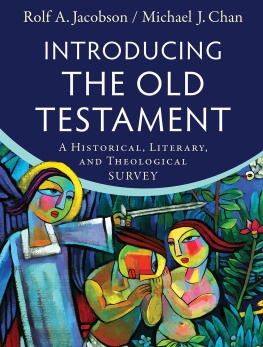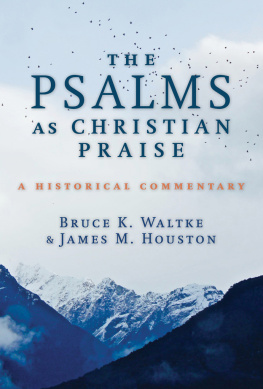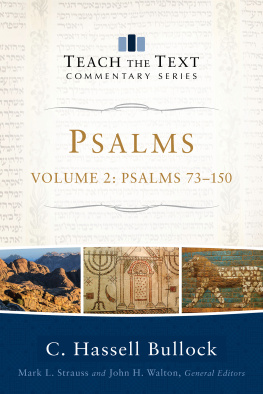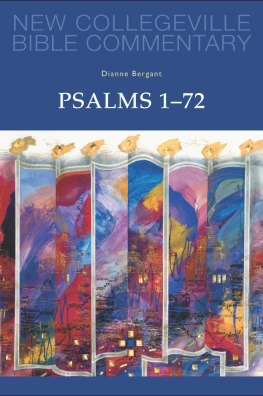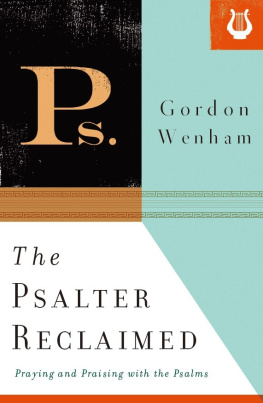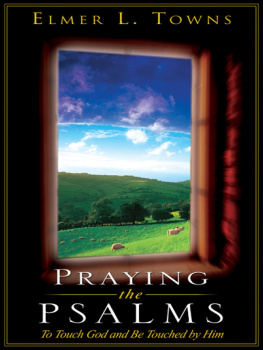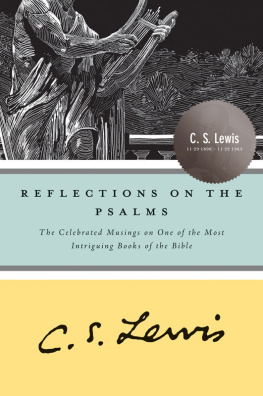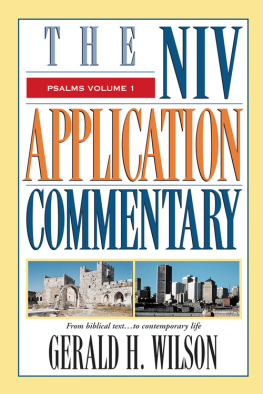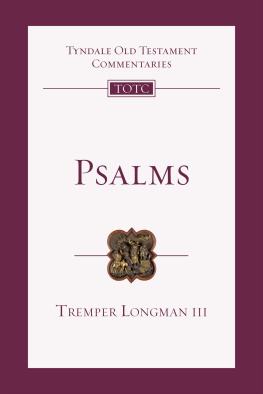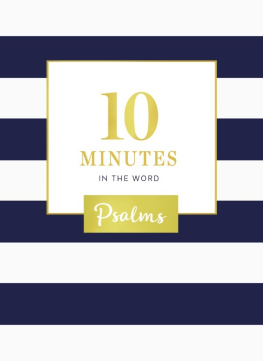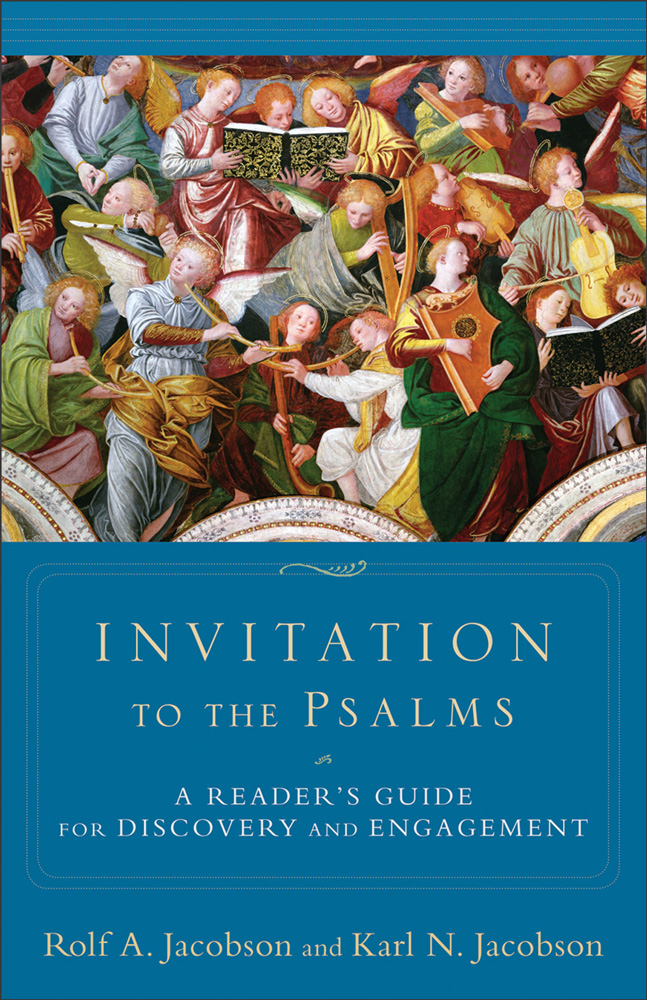2013 by Rolf A. Jacobson and Karl N. Jacobson
Published by Baker Academic
a division of Baker Publishing Group
P.O. Box 6287, Grand Rapids, MI 495166287
www.bakeracademic.com
Ebook edition created 2013
All rights reserved. No part of this publication may be reproduced, stored in a retrieval system, or transmitted in any form or by any meansfor example, electronic, photocopy, recordingwithout the prior written permission of the publisher. The only exception is brief quotations in printed reviews.
ISBN 978-1-4412-4139-9
Library of Congress Cataloging-in-Publication Data is on file at the Library of Congress, Washington, DC.
Unless otherwise indicated, Scripture quotations are from the New Revised Standard Version of the Bible, copyright 1989, by the Division of Christian Education of the National Council of the Churches of Christ in the United States of America. Used by permission. All rights reserved.
Scripture quotations labeled KJV are from the King James Version of the Bible.
Scripture quotations labeled NIV are from the Holy Bible, New International Version. NIV. Copyright 1973, 1978, 1984, 2011 by Biblica, Inc. Used by permission of Zondervan. All rights reserved worldwide. www.zondervan.com
Scripture quotations labeled NJPS are from the New Jewish Publication Society Version 1985 by the Jewish Publication Society. All rights reserved.
Scripture quotations labeled AT are the authors translation.
The internet addresses, email addresses, and phone numbers in this book are accurate at the time of publication. They are provided as a resource. Baker Publishing Group does not endorse them or vouch for their content or permanence.
In this volume, Rolf and Karl Jacobson provide a succinct and approachable guide to understanding the structure and message of the psalms. Students of the book of Psalms often do not have a clear understanding of the nature of Hebrew poetry, the use of imagery in the psalms, and the voices of the psalmists. Or, students overanalyze the psalms and miss the power of their poetic messages. The Jacobsons offer a much-needed middle ground in psalm studies, and Invitation to the Psalms will be a valuable tool in the classroom and the parish for years to come.
Nancy L. Declaisse-Walford , McAfee School of Theology
The authors combine their considerable knowledge (and wit!) to pen an insightful volume that istrue to its titlean excellent guide to discovering and engaging the psalms. But the book does even more, helping readers enjoy, experience, and read the psalms more perceptively. Full of insight and exposition of a host of individual psalms and including discussions of psalmic poetry, genres, voicing, metaphors, and theology, this is an ideal first book on the psalms whether for self-study or for teaching. It will also delight and instruct even those already comfortably at home in the Psalter.
Brent A. Strawn , Candler School of Theology and Graduate Division of Religion, Emory University
Rolf and Karl Jacobson have written a gem of an introduction to the powerful poetry of the psalms. This work is not only a sure guide to the best of modern scholarship, but it also helps readers develop exactly the sort of informed imagination needed to read and pray the psalms effectively. A work of keen literary insight and rare theological depth, this engaging volume will be of great benefit to both beginners and experienced readers of these important texts.
Harry Nasuti , Fordham University
A winsome and inviting book by two specialists who clearly love to read the psalms themselves. Rolf and Karl Jacobson are reliable and friendly guides through the landscape of the psalms, which sometimes seems overly familiar and sometimes rather forbidding. The authors help readers navigate this terrain and emerge on the other side richer for it, well equipped and eager to delve into the psalms themselves.
David M. Howard Jr. , Bethel Seminary
Rolf and Karl Jacobson tackle the complex and often confusing world of ancient biblical poetry and provide an astute an d accessible guide for understanding the book of Psalms. Written in an engaging style with a clear format, Invitation to the Psalms will help students quickly grasp how to use the psalms for individual devotion and group learning. The books examples are engaging and often humorous, keeping students involved in the process of learning poetry in a modern world so devoid of the genre. This work is an important addition for anyone teaching the psalms.
Beth LaNeel Tanner , New Brunswick Theological Seminary
Contents
Cover
Title Page
Copyright Page
Endorsements
Dedication
Introduction
Why Is My Bible Repeating Itself? Learning to Understand Hebrew Poetry
What Is a Psalm? Learning to Understand Different Psalm GenresPart 1
What Is a Psalm? Learning to Understand Different Psalm GenresPart 2
What Is a Psalmist? Learning to Understand the Voice and Life Situations of the Psalms
Is God a Rock, a Light, or a Shepherd? Learning to Understand Metaphors, Imagery, and Symbolism in the Psalms
Who Is the King of Glory? Learning to Understand the Theology of the Psalms
Notes
Scripture Index
Subject Index
Back Cover
Introduction
Let the words of my mouth and the meditation of my heart
be acceptable to you, O L ORD , my rock and my redeemer.
Psalm 19:14
These are the final words of Psalm 19. In the psalm itself, the words are appended as a parting prayer, a faithful wish that God might find the psalmists poem to be an acceptable offering. In some Christian traditions, these words have often been prayed at the start of the sermon, in the hopes that the preachers words might matterif only in some small way.
The words also seemed a fitting way to begin this book because this book is meant more as an invitation to read the psalms, than as an analysis of what the psalms say or mean. The psalms are meant to be read, they are meant to be experienced . Analysis of poetry is helpful and importantbut only if that analysis serves to assist the reader to enter into a poem with greater sensitivity. Analysis is a servant . A competent reader analyzes poetry so that the poetry itself can speak more profoundly. This is true of all poetryand it is especially true of the psalms, which are the poetry of Christian and Jewish faith.
In his influential essay How Does a Poem Mean? John Ciardi writes, Analysis is never in any sense a substitute for the poem. The best any analysis can do is to prepare the reader to enter the poem more For that reason, according to Ciardi, the reader of poetry should not ask, What does a poem mean? but rather, How does a poem mean? Poetry is not merely expressive: it is expression . Poems, that is, do not merely talk about love or passion or emotion: they are the very sound of love, of passion, of emotion.
Because the psalms are the poetry of faith, they are not meant to be studied; they are meant to be read. The prayers of the Psalter are meant to be prayed. The songs of the Psalter are meant to be sung. The lessons of the Psalter are meant to be lived. The angry psalms are meant to be shouted. The meditations are meant to be meditated upon. When it comes to Psalm 23, the most well-known of all psalms, it is not meant as a lesson for a teacher to commend to a student, but a prayer that is meant to be prayed:


